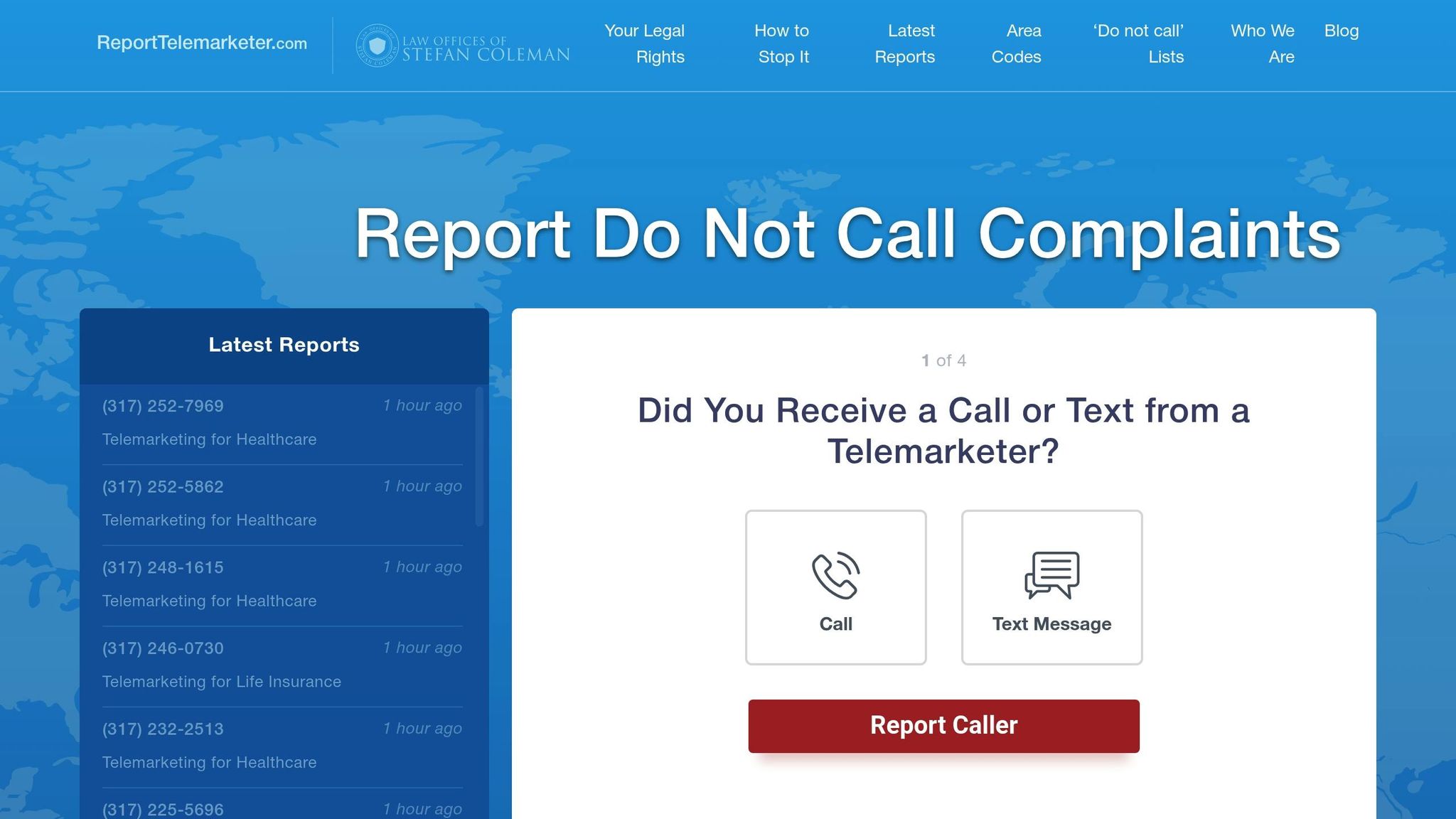
The Telephone Consumer Protection Act (TCPA) protects you from unwanted telemarketing calls, texts, and faxes. If a telemarketer violates these rules, you can claim $500 per violation – or up to $1,500 for intentional violations. Recent court decisions have updated how consent works under the TCPA, making it easier for businesses to comply but raising concerns for consumers. Here’s what you need to know:
- Key Protections: Telemarketers need your consent for automated calls, prerecorded messages, or texts. They must also honor the Do Not Call Registry.
- Recent Changes: The 11th Circuit Court now allows "consent bundling", meaning one consent can apply to multiple calls or messages.
- Filing a Claim: To make a claim, you’ll need proof of consent status, call logs, and evidence of violations like autodialer use.
- Withdrawing Consent: You can cancel consent at any time with a simple verbal or written request.
Pro Tip: Keep detailed records of call dates, times, and any attempts to revoke consent. Services like ReportTelemarketer.com can help you report violations and seek compensation for free.
Want to stop unwanted calls? Read on to learn how to protect your rights and claim compensation.
Challenging TCPA Class Claims in an Evolving Legal Era
Recent Court Rulings on TCPA Claims
Recent court decisions have brought changes to how TCPA claims are assessed, influencing both businesses and consumers. These rulings have introduced new interpretations that affect telemarketing compliance. Below, we highlight key cases shaping TCPA standards.
11th Circuit’s Consent Rule Decision
The 11th Circuit Court of Appeals recently overturned the Federal Communications Commission’s (FCC) long-held one-to-one consent rule. This decision alters how consent is applied under the TCPA, introducing "consent bundling", where a single consent can now apply to multiple calls or messages.
Previously, consent was needed for each individual call. Now, one consent can cover multiple communications:
| Aspect | Previous Approach | Current Approach |
|---|---|---|
| Consent Requirement | Separate consent for each call | Single consent applies to multiple calls or messages |
"The decision pivots consent interpretation under the TCPA, easing burdens on telemarketers but heightening consumer privacy concerns." – Legal Expert, Telecommunications Law Review
sbb-itb-a8d93e1
Consent Rules Update
Recent court decisions have reshaped how consent is handled under the TCPA, providing clearer guidance for telemarketing permissions.
How to Cancel Consent
The rulings emphasize that consumers have the right to withdraw consent through straightforward verbal or written requests.
Following Consent Rules
To stay compliant, businesses need to establish solid systems for managing consent. These systems not only help meet legal obligations but also reduce complaints from consumers.
Key points for compliance include:
- Record keeping: Maintain accurate records to minimize risks and handle disputes effectively.
- Staff training: Regularly train staff to understand and follow consent protocols.
- Automated updates: Use automated systems to promptly update consent statuses.
"Businesses must ensure that their consent processes are not only compliant but also user-friendly, allowing consumers to easily revoke consent when they choose." – Stefan Coleman, Lawyer and Founder of ReportTelemarketer.com
Failing to comply with TCPA rules can result in hefty fines. On the flip side, respecting communication preferences can build trust; 78% of consumers are more likely to interact with companies that prioritize their preferences.
These updated rules set the stage for the next section, which explores consumer reporting options.
ReportTelemarketer.com Services

If you’re tired of annoying calls, ReportTelemarketer.com offers a solution by addressing violations of the Telephone Consumer Protection Act (TCPA). Over 30,000 people have already used this platform to put an end to unwanted calls.
Report Unwanted Calls
Submitting a report is simple and straightforward. When you receive an unwanted telemarketing call, you can use the platform’s online system to file a report. Here’s what the process involves:
- Sharing details about the call, like the date, time, and content.
- Providing information about the telemarketer.
- Explaining any previous efforts you made to stop the calls.
- Adding supporting evidence, such as screenshots or call recordings.
Once submitted, a team reviews your report to check if the telemarketer violated TCPA rules, such as calling without proper consent. These reports are critical for taking quick legal action.
"We stop the calls for you. Our service is free, and we do all the work for you." – Stefan Coleman, Lawyer and Founder of ReportTelemarketer.com
Legal Action and Compensation
If a TCPA violation is found, ReportTelemarketer.com takes immediate steps to address it:
| Action Step | Result |
|---|---|
| Initial Investigation | Determines if TCPA rules were violated. |
| Cease and Desist | Sends a formal request to stop the calls. |
| Legal Filing | Files a TCPA complaint if necessary. |
| Compensation Claims | Pursues up to $500 per violation. |
The best part? The service is completely free for users. Any legal fees are recovered directly from telemarketers after successfully resolving the case.
For example, one user reported repeated calls from a health insurance telemarketer. After submitting their report, the platform investigated, identified the caller, and issued a cease and desist letter. This action made the user eligible for compensation under TCPA guidelines.
Summary
Recent court rulings have reshaped how TCPA claims are evaluated, focusing on stricter consent requirements and varying interpretations of autodialer definitions. For instance, the 11th Circuit now requires telemarketers to obtain clear and explicit prior consent, raising the bar for compliance with TCPA standards.
These changes provide stronger protections for consumers. However, the differing interpretations of what qualifies as an autodialer across courts can complicate claims. Under the current framework, consumers are entitled to $500 per violation if telemarketers fail to obtain proper consent.
To build a strong case, keeping thorough records is crucial. Here’s what to document:
| Information to Document | Why It Matters |
|---|---|
| Call Date and Time | Establishes a timeline of violations |
| Caller Information | Identifies the responsible party |
| Consent Status | Confirms whether permission was granted |
| Previous Stop Requests | Demonstrates attempts to revoke consent |
Detailed records can help consumers take advantage of these protections. Services like ReportTelemarketer.com, which has already helped over 30,000 people, make it easier to stop unwanted calls and seek compensation.
"Prior express consent is required for telemarketers to contact consumers, and it must be clear and unambiguous." – 11th Circuit Court